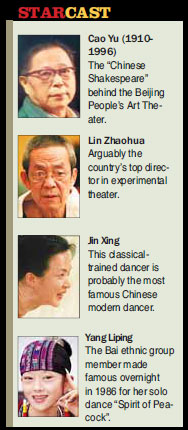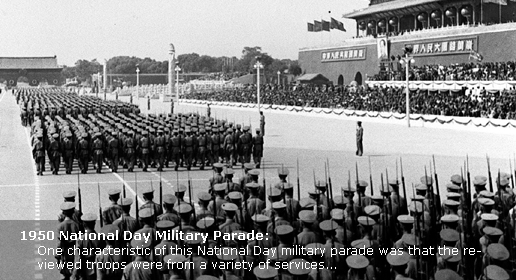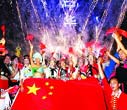60 People, 60 Stories
Staging love
By Chen Jie (China Daily)
Updated: 2009-09-30 09:25
|
 Meng Jinghui is looking to expand the space for theater. [China?Daily] |
| ||||
Fueled by the afterglow of recent success, it was going to be a beautiful day.
The night before, the dramatist and a hundred other young directors, actors and theater-goers partied at a bar near the Central Academy of Drama to celebrate the achievements of the Beijing Youth Theater Festival, the first festival he set up and worked as artistic director.
For thousands of the city's youngsters, the festival made them fall in love with theater. In 19 days, 12 young directors presented 11 plays in a variety of styles ranging from the absurd and mime to the physical and musical. All explored the multiple dimensions of modern society and human sentiment.

"Beijing has various festivals including an annual international drama festival. But most of them get government support big and classic productions or blockbusters. We want to do a different a festival, specially for young people who have their own interpretation of theater, who try to experiment with different styles or who cannot afford very professional productions," says Meng, 39.
"In our slogan, theater is likened to love. I hope this year's festival is the first love.
"As a director, it has been my dream to have my own theater." It seemed a long ago - all of two decades - when he had to ride his bicycle across the capital looking for venues.
"Beijing has so many theaters but they prefer to run commercial productions rather than experimental dramas. Whenever I called to rent a theater, they said they had booked out and asked me to wait.
"I cannot wait any longer."
Last year, he settled on a closed cinema near Dongzhimen and raised funds from like-minded friends. They jointly invested 5 million yuan to turn the old cinema into a 3,600-sq-m theater with 380 seats.
"Theater is a space to realize dreams. It can be simple, without frills or dazzling decoration, but not shabby. I hope my theater allows audiences to experience a variety of delicate and mysterious visual spaces."
Before the Beijing Youth Theatre Festival, Meng's most popular production Rhinoceros in Love had been running more than 40 shows since June 9. It is now on its second run until the end of November.
In Meng's eyes, Rhinoceros in Love is an auspicious play that always brings him luck. Since its debut in 1999, the play has caused big stirs among young audiences across China with its passion, pain and power.
In his 2008 version at the new Citycomb Theater, Meng builds a 7-m-high mirror wall backstage. With a bed hanging over the auditorium, Ma Lu and Ming Ming run on a huge jogging machine as a metaphor for making love.
The stage is covered by tons of falling water in the final act and all the performers are drenched.
He also has plans to collaborate with the British Council to host the Best of the Edinburgh Fringe Festival at the Citycomb Theater from Nov 4 to Dec 7. Over the five weeks, theater-goers will get a rare opportunity to sample a range of the unique styles and traditions that make up contemporary UK theater.
Meng is, after all, a director. Besides managing the theater and organizing events, he is working on a new play adapted from Fassbinder's Love Is Colder Than Death.
"I want to set up a 'theater utopia' where people can do things as freely as they like."
Time Line
1951
Initiated by Mao Zedong, the China Academy of Local Operas is established in Beijing to promote the development of theatrical art. Renowned Peking Opera artist Mei Lanfang (1894-1961) is named as its president.
1959
The Central Ballet of China (now National Ballet of China) is founded with its talent pool from the Beijing Dance Academy, which was established in 1954. The dancers receive training from Pyotr Gusev of the former Soviet Union. Under his guidance, the company produces Swan Lake, Giselle and Le Corsaire.
1960s and 1970s
During the "cultural revolution" (1966-76), all theatrical performances are banned except for the eight yangbanxi, including five Peking Opera plays, two ballets and one symphony, all with a revolutionary theme.
1982
Lin Zhaohua directs The Warning Signal at the Beijing People's Art Theater. It is the first experimental small-theater play in China.
1998
Directed by China's leading film director Zhang Yimou, Puccini's opera Turandot is performed at the Forbidden City under the baton of Zubin Mehta. It becomes the first large-scale show of its kind in China, drawing celebrities from all over the world to watch it at the ancient venue.
2001
The China Youth Art Theater and Central Experimental Drama Theater merge to form the National Theater Company of China.
2000s
Private, small-budget theater productions and extravaganzas with government support flourish. People are more open-minded about the presentations and themes of the theatrical works as more productions tour abroad.








